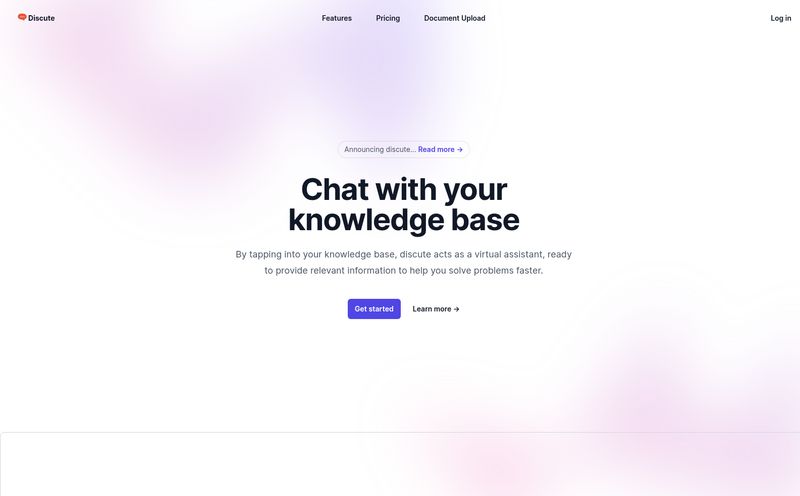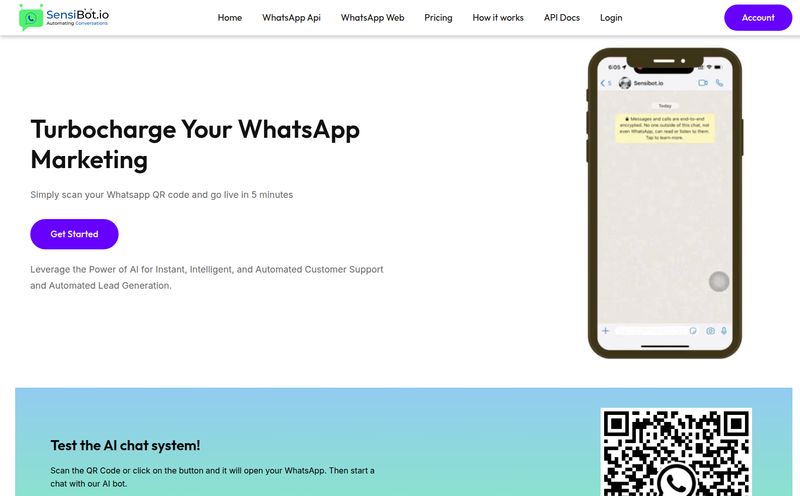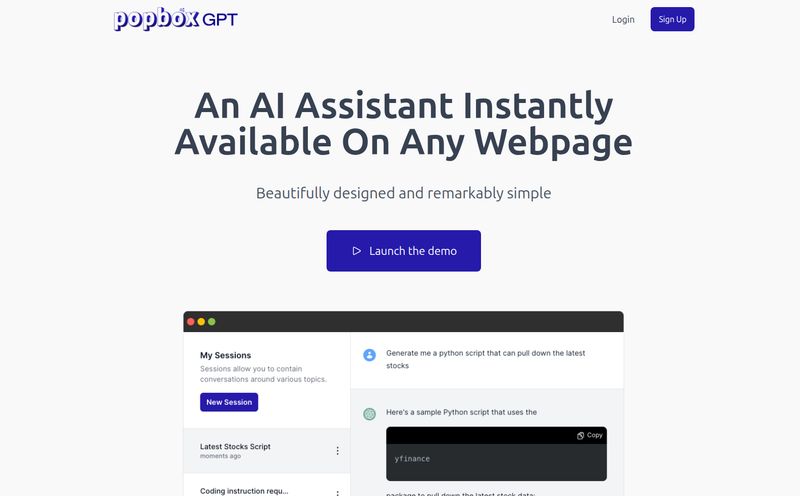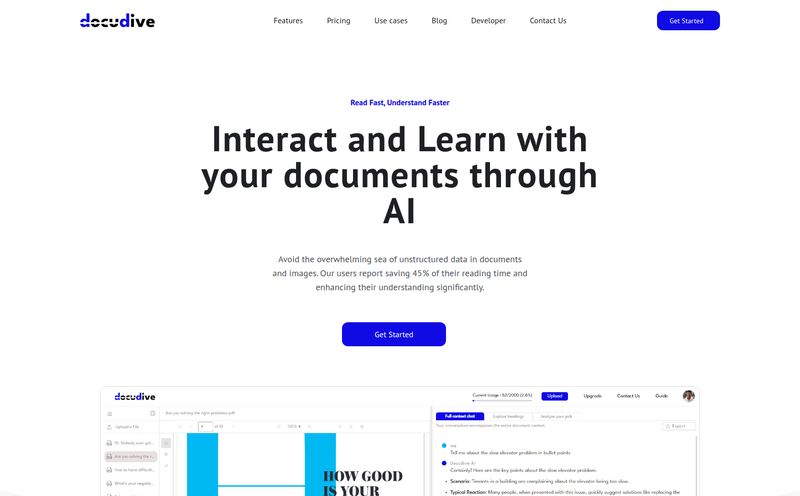If you work in the climate or energy sector, your browser probably looks a lot like mine used to: a chaotic mess of 57 open tabs. You’ve got a government policy document from the Department of Energy, a dense academic study on battery degradation, a think tank's annual report, and about a dozen news articles all screaming for your attention. It’s a full-time job just to separate the signal from the noise.
I’ve spent years navigating this data deluge, and frankly, it can be exhausting. You're constantly second-guessing sources. Is this report legit, or is it just some slick corporate greenwashing? It’s like trying to drink from a firehose, and you’re just hoping a few drops of clean, usable water actually make it into your mouth.
So when I stumbled upon a tool called Telborg, which bills itself as an AI research assistant specifically for people like us, my curiosity was definitely piqued. Another AI tool, you ask? I know, I know. But this one felt different. It wasn’t trying to be everything to everyone. It was built for a niche, and as we all know, that’s often where the magic happens.
Drowning in Data? Telborg Throws You a Life Raft
At its core, Telborg is designed to tackle that core problem: the overwhelming firehose of information. What really caught my eye on their site was the phrase “Credibility-first.” Hallelujah. In a field where data integrity is everything, this is a massive statement. The platform claims to source its information directly from ministries, corporations, startups, government agencies, universities, and industry bodies. Essentially, the places we’re already trying to pull from, but it does the heavy lifting for us.
It’s not just another search engine. It’s positioned as a research partner. The idea is to spend less time scrolling and more time analyzing, strategizing, and, you know, actually doing the work that matters. It’s a bold promise, so I had to see what was actually under the hood.
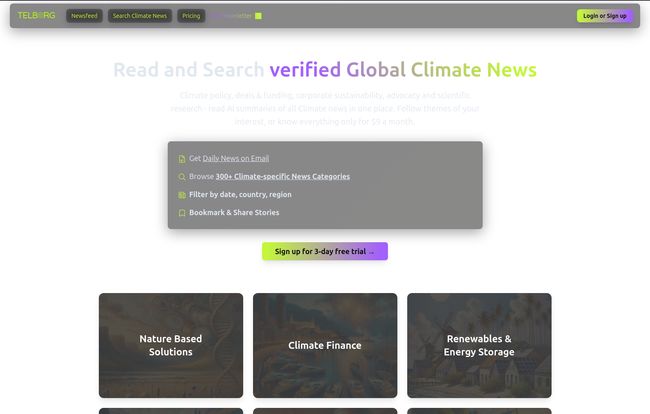
Visit Telborg
So What Exactly Does Telborg Do? A Look at the Toolkit
After playing around with it, I can see it’s more than just a curated newsfeed. It has a few distinct features that work together to create a pretty compelling workflow for climate tech investors, green tech founders and policy wonks.
Your Personal AI Research Analyst
This is the centerpiece. You can upload your own documents—think of that 200-page PDF report you’ve been dreading—and start asking it questions. Instead of CTRL+F-ing your way through jargon-filled pages, you can just ask, “What are the key takeaways regarding lithium-ion battery recycling in this document?” or “Summarize the policy recommendations on page 78.” It's like having a junior analyst on call 24/7 who never needs a coffee break. The potential time savings here are... significant.
The Voice Assistant for Pre-Meeting Prep
Okay, this feature is just plain cool. We’ve all been there: frantically trying to cram in last-minute research on the way to a big meeting. Telborg has a voice assistant designed for this exact scenario. You can ask it to brief you on the latest developments in, say, hydrogen fuel cells or carbon capture technology while you’re driving or grabbing a coffee. It’s a small touch, but one that shows a deep understanding of teh professional’s actual day-to-day grind.
More Than Just Data, It's About Connection
The platform also includes a community aspect, allowing you to interact with other energy experts. This is an underrated component. The climate tech world moves at a breakneck pace, and sometimes the most valuable insights come from a quick chat with a peer who just tackled a similar problem. They also offer a focused newsfeed covering specific categories like Renewables & Energy Storage, Climate Finance, and Industrial Decarbonisation. It’s a great way to stay on top of your specific vertical without the noise of a general news aggregator.
Who Is This Really For? Finding the Right Fit
Let's be clear: Telborg isn't for everyone. And that's a good thing. If your work touches on AI ethics in healthcare, this ain't it. But if you’re a venture capitalist vetting green tech startups, a founder preparing a pitch deck, or a policy analyst tracking energy legislation, you are the bullseye of their target audience.
One thing to be aware of is its current sharp focus on the Energy Storage sector. For someone like me who is deep in that world, this is fantastic. The depth is more valuable than breadth. However, if your focus is on, say, regenerative agriculture, you might find it a bit limited for now. I’d imagine they have plans to expand, but as of today, it’s a specialist’s tool. Which, again, can be a huge advantage if you’re that specialist.
Let's Talk Money: The Telborg Pricing Tiers
Alright, the all-important question: what’s it cost? The pricing structure seems to be split between their News service and the more powerful Research tool. It's a little confusing at first glance, but here’s how I’ve broken it down based on their site and the info I found.
| Plan | Price | Key Features |
|---|---|---|
| Free News | $0/month | Read top climate stories, basic news search. Good for a casual look. |
| Reader News | $7.5/month (billed annually) | Customised daily email briefings, advanced search filters, support. |
| Researcher News | $12.5/month (billed annually) | Full article access, priority support, early access to new features. |
| Starter Research Tool | $35/month | Unlimited queries, document uploads (20/mo), export to Word/PDF, private searches. |
| Annual Research Tool | $400/year | Everything in Monthly, plus voice assistant, and add your own data. |
Note: The pricing for the core research tool seems to be separate from the news-focused plans. Always check their official pricing page for the most current information.
So, is it worth it? Honestly, if the $35 monthly plan saves you even two or three hours of high-value research time, it’s already paid for itself. Think about the hourly rate of a consultant or an investment analyst. It’s a no-brainer from an ROI perspective.
My Honest Take: The Good, The Bad, and The Potential
No tool is perfect, and a balanced view is always best. I'm genuinely excited by what Telborg is building. The commitment to credible, niche-specific data is a breath of fresh air. It feels less like a generic AI chatbot and more like a purpose-built piece of professional equipment, like a high-end thermal camera for an energy auditor.
The main drawback right now is the narrow focus and the lack of a team plan. For large consulting firms or investment houses, the inability to roll this out to a whole team could be a sticking point. However, I have a feeling that’s on their roadmap. Every great product has to start with a focused beachhead market before expanding.
For the individual researcher, analyst, or founder in the energy space, Telborg presents a pretty compelling value proposition. It’s a tool that understands the language you speak and the challenges you face every single day.
Frequently Asked Questions about Telborg
What makes Telborg's sources credible?
Telborg focuses on primary and reputable secondary sources. This includes direct publications from government bodies (like the IEA or EPA), peer-reviewed university studies, corporate annual reports, and reports from established think tanks, avoiding the lower-quality blog spam that can clog up standard search results.
Can I try the paid features before committing?
The images show a “Sign up for 3-day Free Trial” button, which suggests you can test out the premium features. It's always best to check their homepage for the latest trial offers. They also have a completely free tier for basic news access.
How does the voice assistant for meeting prep work?
It's designed for on-the-go use. You can verbally ask the assistant questions like “Give me the latest updates on solid-state batteries” and it will synthesize information from its credible database to give you a spoken briefing, much like asking a smart speaker for the weather, but for deep-tech topics.
Is my uploaded data kept private?
The paid research plans specifically mention the ability to “Enable private searches.” This implies that your work and the documents you upload are kept confidential within your account, which is a critical feature for professionals handling sensitive or proprietary information.
Can I use Telborg for topics outside of energy?
Currently, Telborg's primary strength and focus is on the climate and energy sector, with a particularly deep well of information on energy storage. While you might find some tangential information, it is not optimized for research in completely unrelated fields like medicine or finance.
The Verdict? A Promising Tool for a Demanding Field
In the high-stakes world of climate and energy, having the right information at the right time is more than just an advantage; it's a necessity. Tools like Telborg are moving us away from the era of endless, frustrating searches and toward a future of instant, reliable insights.
It’s not a magic wand, but it’s a powerful lever. For the right professional, it could be the difference between being overwhelmed by data and being empowered by it. And in the race to build a sustainable future, that's a difference that truly matters. I, for one, will be keeping a very close eye on them.
